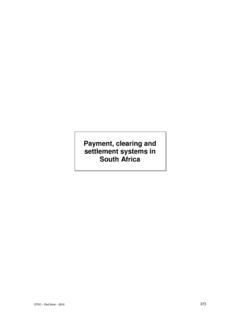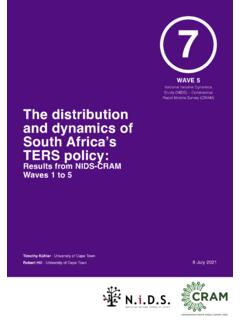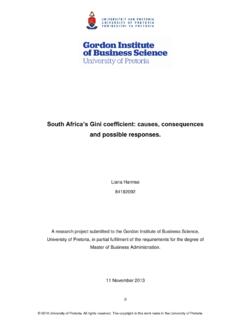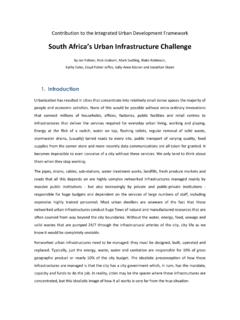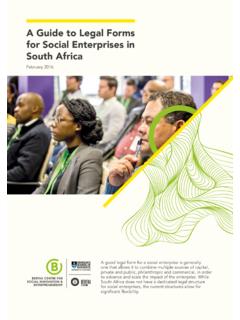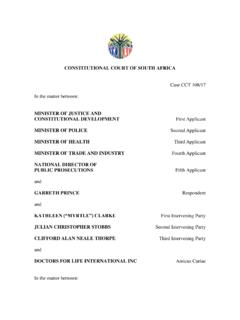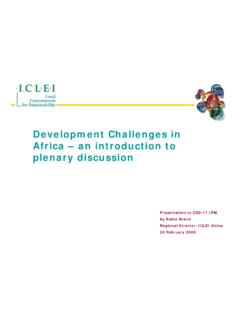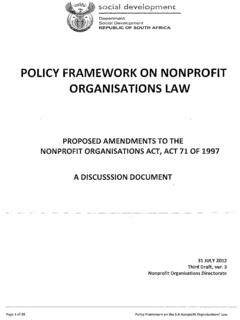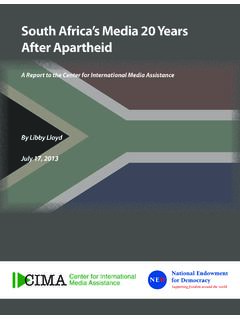Transcription of South Africa’s Education Crisis: The quality of education ...
1 South Africa's Education Crisis: The quality of Education in South Africa 1994-2011. Nicholas Spaull Report Commissioned by CDE. October 2013. BOARD: L Dippenaar (chairman), A Bernstein (executive director), A Ball, N Behrens, E Bradley, C Coovadia, B Figaji, M Le Roux, S. Maseko, I Mkhabela, M Msimang, W Nkuhlu, S Pityana, S Ridley, A Sangqu, E van As INTERNATIONAL ASSOCIATE Prof P Berger 5 Eton Road, Parktown 2193, Johannesburg, South Africa PO Box 1936, Johannesburg 2000. Telephone: +27 (0)11 482-5140 Fax: +27 (0)11 482-5089 Reg No: 026-485-NPO. Contents Executive Summary .. 3. Introduction .. 10. Background .. 10. Local studies of educational achievement .. 13. International comparisons of educational achievement .. 16. Teacher content knowledge .. 24. National Senior Certificate performance: retention and subject-choice .. 31. Inequality of educational opportunity .. 35. Insurmountable learning 39. Transitions from school to work and tertiary institutions.
2 45. Policy 53. Conclusion .. 57. References .. 61. 2. Executive Summary The aim of this report is to provide an empirical overview of the quality of Education in South Africa since the transition to democracy and, in doing so, comment on the state of the country's Education system. It will become increasingly clear that the weight of evidence supports the conclusion that there is an on-going crisis in South African Education , and that the current system is failing the majority of South Africa's youth. By using a variety of independently conducted assessments of pupil achievement the report shows that with the exception of a wealthy minority most South African pupils cannot read, write and compute at grade-appropriate levels, with large proportions being functionally illiterate and innumerate. As far as educational outcomes, South Africa has the worst Education system of all middle-income countries that participate in cross-national assessments of educational achievement.
3 What is more, we perform worse than many low-income African countries. The annually-reported statistics from the National Senior Certificate (NSC) exam in Grade 12 are particularly misleading since they do not take into account those pupils who never make it to Grade 12. Of 100 pupils that start school, only 50 will make it to Grade 12, 40 will pass, and only 12 will qualify for university. Those 18-24-year-olds who do not acquire some form of post-secondary Education are at a distinct economic disadvantage and not only struggle to find full-time employment, but also have one of the highest probabilities of being unemployed for sustained periods of time, if not permanently. While there have been some recent improvements in pupil outcomes, as well as some important policy innovations, the picture that emerges time and again is both dire and consistent: however one chooses to measure learner performance, and at whichever grade one chooses to test, the vast majority of South African pupils are significantly below where they should be in terms of the curriculum, and more generally, have not reached a host of normal numeracy and literacy milestones.
4 As it stands, the South African Education system is grossly inefficient, severely underperforming and egregiously unfair. South Africa's performance on local and international studies of educational achievement South Africa currently participates in a number of local and international tests of educational achievement. The recently implemented Annual National Assessments (ANAs), which are annual, nationally-standardised tests of achievement for Grade One to Six and Nine, are one of the most important policy developments in the last 10 years. In principle they provide some standardised indication of learning at the primary grades allowing for the early identification and remediation of learning deficits. They were implemented for the first time in February 2011, with the most recent round being conducted in September 2012. Although the tests are marked and invigilated by teachers themselves, the 2011 ANAs were externally verified by the HSRC who re-marked a sample of scripts from Grades Three and Six.
5 The 2012 ANAs were not externally verified, but the Department of Basic Education did undertake some form of internal moderation. While the 2011 tests, in agreement with most other available evidence, showed that the vast majority of pupils in South Africa are seriously underperforming relative to the curriculum, the 2012 ANAs showed impossibly large increases for the Foundation Phase (a year-on-year increase of 49 per cent in the case of Grade Three literacy) and have subsequently come under considerable critique by academics across the country. While these 3. tests are especially important in improving the quality of Education in South Africa, their current implementation and lack of external verification reduces much of their value. The three main international tests of educational achievement that South Africa participates in are TIMSS, PIRLS and These tests show how the performance of South African pupils has changed over time relative to earlier cohorts of South African pupils, and relative to other countries participating in these studies.
6 SACMEQ 2000 and 2007 Southern and Eastern African Consortium for Monitoring Educational quality (Grade Six numeracy and literacy). SACMEQ II (2000) and SACMEQ III (2007) showed that there was no improvement in South African Grade Six literacy or numeracy performance over the seven year period. Given that 13 other African countries also participated, it is possible to compare the achievement levels of South African Grade Six children with other Grade Six children on the continent. In the most recent round of SACMEQ (2007), South African pupils ranked 10th of the 14 Education systems2 for reading and 8th for mathematics, behind much poorer countries such as Tanzania, Kenya and Swaziland. The study found that 27 per cent of South African Grade Six pupils were illiterate since they could not read a short and simple text and extract meaning, with the proportion varying significantly by province: half (49 per cent) of all Grade Six pupils in Limpopo were illiterate, while only 5 per cent of pupils in the Western Cape were thus classified.
7 TIMSS 1995, 1999, 2002, 2011 Trends in International Mathematics and Science Study (Grade Eight/Nine mathematics and science). The TIMSS study, which tests mathematics and science, showed that there was no improvement in Grade Eight mathematics or science achievement between 1995 and 2002. Following on from this, it was decided that the international Grade Eight tests were too difficult for South African Grade Eight pupils, so that in 2002 both Grade Eight and Grade Nine pupils wrote the Grade Eight test, and in 2011 only Grade Nine pupils wrote the Grade Eight test. Comparing the performance of Grade Nine pupils between 2002 and 2011 showed that there was a noticeable improvement in maths and science performance amounting to approximately one and a half grade levels of learning. This shows that there has been some improvement over the period. While this is hopeful, it is difficult to celebrate when one considers how low the post-improvement level of performance really is.
8 For example, in 2011 a third of pupils (32 per cent) performed worse than guessing on the multiple choice items ( no better than random). Furthermore, three quarters (76 per cent) of Grade Nine pupils in 2011 still had not acquired a basic understanding about whole numbers, decimals, operations or basic graphs, and this is at the improved level of performance. Part of the reason for the improvement is the fact that South Africa started from an exceedingly low base in 2002. To place this in perspective, South Africa's post-improvement level of performance is still the lowest of all participating countries, with the average South African Grade Nine child performing between two and three grade levels lower than the average Grade Eight child from other middle-income countries. Teacher content knowledge 1. TIMSS stands for Trends in International Mathematics and Science Study, PIRLS stands for Progress in International Reading and Literacy Studies, and SACMEQ stands for Southern and Eastern African Consortium for Monitoring Educational quality .
9 2. Zanzibar and Tanzania are tested separately, making 15 Education systems but only 14 countries. 4. In addition to testing Grade Six pupils, SACMEQ III (2007) also tested Grade Six teachers. Analysis of this data shows that many South African mathematics teachers have below-basic levels of content knowledge, with high proportions of teachers being unable to answer questions aimed at their pipils. Grade Six mathematics teachers from quintiles one, two and three have similar levels of content knowledge to the average teacher in Mozambique, Zambia and Malawi, and have substantially lower content knowledge than teachers in Kenya, Zimbabwe, Uganda and Tanzania. Similarly, rural maths teachers in South Africa have significantly lower levels of content knowledge than rural maths teachers in Swaziland, Tanzania, Uganda and Kenya. Given that the teacher and pupil tests are scaled to be comparable, it is shocking to note that the top 5 percent of Grade Six pupils in South Africa (565.)
10 Pupils) scored higher marks on the same mathematics test than the bottom 20 per cent of Grade Six mathematics teachers in the sample (80 teachers). Given that teachers cannot teach what they do not know, these findings have severe implications for the quality of Education in South Africa. Unless the content knowledge (and thereafter pedagogical content knowledge) of mathematics teachers in poor and rural areas is improved, it will be exceedingly difficult to raise pupil achievement in these areas. National Senior Certificate performance: retention and subject choice While many critics have pointed out that the National Senior Certificate (NSC) pass requirements are sub-standard and encourage mediocrity, arguably the more serious problem is widespread drop-out before Grade 12, and that over time more pupils seem to be choosing less demanding exam subjects. Regarding the latter, it is revealing to note that over the four year period between 2008 and 2011, the proportion of pupils taking mathematics (as opposed to maths literacy) has fallen from 56 per cent to 45 per cent, as more pupils opt for the easier maths literacy.




